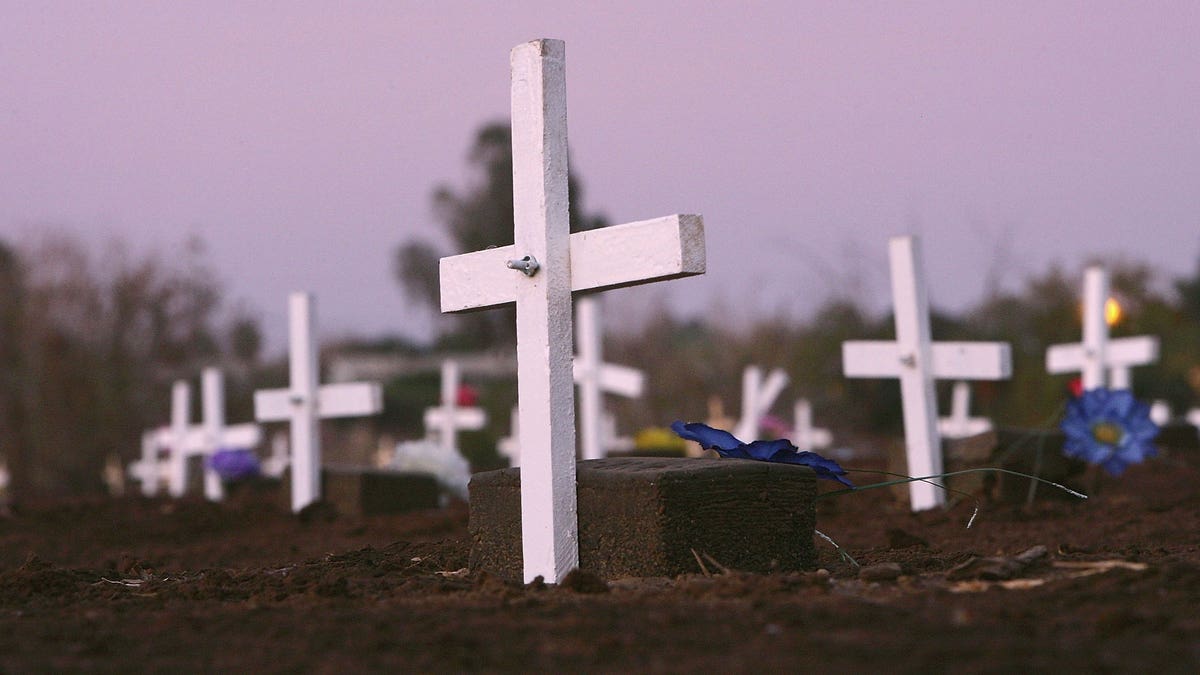
CALEXICO, CA - FEBRUARY 02: Grave marker crosses are seen in the night after activists on the "March for Migrants" placed them on the graves of approximately 400 people in a cemetery plot set aside for unidentified people who died trying to cross illegally into the US from Mexico on the anniversary of the signing of the treaty of Guadalupe-Hidalgo on February 2, 2006 in Holtville near the border town of Calexico, California. Among a host of issues that the "March for Migrants" caravan is pushing are opposition to HR 4437 bill to beef up border operations, demand for action in the case of Guillermo Martinez Rodriguez who was allegedly killed by US Border Patrol agents, and to bring attention to some 4000 migrants who have died since the inception of Operation Gatekeeper in 1994 to increase border patrols, according to the group. The activists will travel throughout much of the West and along the US/Mexico border ending in Washington D.C. with three days of rallies and visits to legislators starting February 18. (Photo by David McNew/Getty Images) (2006 Getty Images)
The woman who wasn’t allowed to bury her husband’s ashes in a South Texas cemetery because he was Mexican is now planning to sue the caretaker — even though he then conceded.
According to the lawsuit, in February Dorothy Barrera was turned away by San Domingo cemetery’s Jimmy Bradford saying, “Go up the road and bury him with the n**s and the Mexicans.”
The Mexican American Legal Defense and Education Fund (MALDEF) has also filed a suit on behalf of the American G.I. Forum, a civil rights group, charging that Bradford and the Normanna Cemetery Association violated longstanding civil rights protections.
They call it “post-mortem racial segregation.”
“She took her husband’s remains to the cemetery not even thinking about the fact that she might be turned away,” Marisa Bono, attorney with MALDEF told Fox News Latino. “She figured she’d be buried there [the widow is white] and she wanted to be buried with her husband,” she added.
“This case demonstrates how regrettably deep the roots of anti-Latino prejudice are in this country and in Texas,” MALDEF also said in a statement.
Barrera’s attorney, Sid Arismendez, said he will be filing a civil case against Normanna Cemetery Association on Thursday.
"Any settlement would include the dissolution of the three-member board that runs the Association, a new board, which includes people of color, and this segregation to be abolished," Arismendez said.
He said his client is taking legal action on behalf of people of all races who may be discriminated against.
“I’m scared, but I’m not giving up. I’m going to fight for everyone, red, yellow, black or white,” Barrera said, as quoted by Express News. “The Bible says we are all God’s children and I’m going to fight for that.”
In March, the cemetery relented and gave Barrera the green light to bury her 74-year-old husband, Pedro. However, according to the lawsuit, Bradford arrived at her house with armed officers and felt intimidated, so she declined the offer.
“She’s a sick and elderly woman and Bradford said he’d brought the officers for his protection,” Bono told FNL.
“I was very hurt by what he told me about my husband. I never thought of him being a Mexican. We were married 44 years and I really haven’t had time to grieve,” she added.
MALDEF is seeking a court order that puts an immediate end to the discriminatory practices at the San Domingo Cemetery and allows people of all races to be buried there.
“There are a lot of Latino families in the area who’re simply resigned to this kind of thing. This is symbolic of a bigger problem in rural Texas,” Bono said.
“There are other segregated cemeteries in rural Texas, and when we’ve finished with this case, we’d like to follow up on those as well.”




















